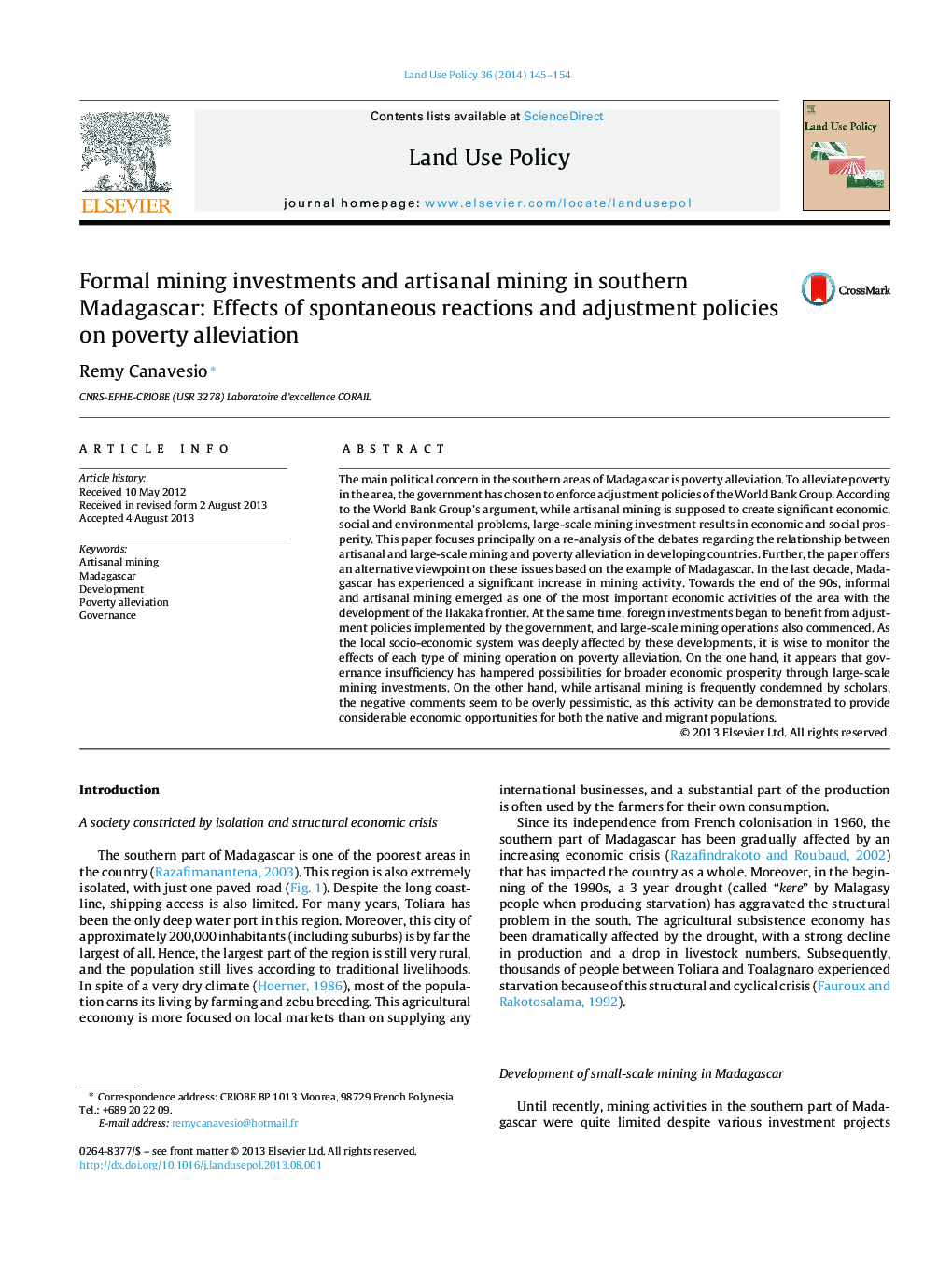| کد مقاله | کد نشریه | سال انتشار | مقاله انگلیسی | نسخه تمام متن |
|---|---|---|---|---|
| 6548923 | 160113 | 2014 | 10 صفحه PDF | دانلود رایگان |
عنوان انگلیسی مقاله ISI
Formal mining investments and artisanal mining in southern Madagascar: Effects of spontaneous reactions and adjustment policies on poverty alleviation
ترجمه فارسی عنوان
سرمایه گذاری معادن و استخراج معادن در جنوب ماداگاسکار: تاثیر واکنش های خود به خود و سیاست های تعدیل در کاهش فقر
دانلود مقاله + سفارش ترجمه
دانلود مقاله ISI انگلیسی
رایگان برای ایرانیان
کلمات کلیدی
استخراج معادن، ماداگاسکار، توسعه، کاهش فقر، حکومت،
ترجمه چکیده
نگرانی اصلی سیاسی در مناطق جنوبی ماداگاسکار نابودی فقر است. برای رفع فقر در منطقه، دولت تصمیم به اجرای سیاست های تعدیل شده گروه بانک جهانی کرده است. با توجه به استدلال گروه بانک جهانی، اگرچه معادن صنعتی میتوانند مشکلات اقتصادی، اجتماعی و زیست محیطی ایجاد کنند، سرمایهگذاری در مقیاس کوچک منجر به رونق اقتصادی و اجتماعی میشود. این مقاله به طور عمده بر تحلیل مجدد بحث های مربوط به ارتباط بین معادن و مقیاس بزرگ معدن و کاهش فقر در کشورهای در حال توسعه تمرکز دارد. علاوه بر این، این مقاله بر مبنای نمونه ای از ماداگاسکار، دیدگاه دیگری را در مورد این مسائل ارائه می دهد. در دهه گذشته، ماداگاسکار افزایش قابل توجهی در فعالیت های معدن داشته است. در اواخر دهه 90 میلادی، معادن غیررسمی و صنایع دستی به عنوان یکی از مهمترین فعالیتهای اقتصادی این منطقه با توسعه مرز ایلاکاوا روبرو شد. در همان زمان، سرمایه گذاری های خارجی شروع به استفاده از سیاست های تنظیم سیاست های دولت انجام داد و عملیات استخراج معادن نیز آغاز شد. همانطور که سیستم اجتماعی و اقتصادی محلی به شدت تحت تاثیر این تحولات قرار داشت، نظارت بر اثرات هر نوع عملیات استخراج معادن بر کاهش فقر عاقلانه است. از یک طرف، به نظر می رسد که کمبود مدیریت، از طریق سرمایه گذاری های بزرگ در زمینه معادن، فرصت های اقتصادی وسیع را از بین برده است. از سوی دیگر، در حالی که معادن صنعتی اغلب توسط محققان محکوم می شوند، نظرات منفی به نظر می رسد بیش از حد بدبینانه است، چرا که این فعالیت را می توان برای ارائه فرصت های اقتصادی قابل توجه برای هر دو جمعیت بومی و مهاجران نشان داد.
موضوعات مرتبط
علوم زیستی و بیوفناوری
علوم کشاورزی و بیولوژیک
جنگلداری
چکیده انگلیسی
The main political concern in the southern areas of Madagascar is poverty alleviation. To alleviate poverty in the area, the government has chosen to enforce adjustment policies of the World Bank Group. According to the World Bank Group's argument, while artisanal mining is supposed to create significant economic, social and environmental problems, large-scale mining investment results in economic and social prosperity. This paper focuses principally on a re-analysis of the debates regarding the relationship between artisanal and large-scale mining and poverty alleviation in developing countries. Further, the paper offers an alternative viewpoint on these issues based on the example of Madagascar. In the last decade, Madagascar has experienced a significant increase in mining activity. Towards the end of the 90s, informal and artisanal mining emerged as one of the most important economic activities of the area with the development of the Ilakaka frontier. At the same time, foreign investments began to benefit from adjustment policies implemented by the government, and large-scale mining operations also commenced. As the local socio-economic system was deeply affected by these developments, it is wise to monitor the effects of each type of mining operation on poverty alleviation. On the one hand, it appears that governance insufficiency has hampered possibilities for broader economic prosperity through large-scale mining investments. On the other hand, while artisanal mining is frequently condemned by scholars, the negative comments seem to be overly pessimistic, as this activity can be demonstrated to provide considerable economic opportunities for both the native and migrant populations.
ناشر
Database: Elsevier - ScienceDirect (ساینس دایرکت)
Journal: Land Use Policy - Volume 36, January 2014, Pages 145-154
Journal: Land Use Policy - Volume 36, January 2014, Pages 145-154
نویسندگان
Remy Canavesio,
